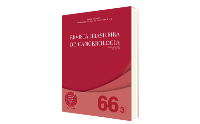Survival and Prognostic Factors of Kaposi’s Sarcoma Patients Attended at a High Complexity Oncology Care Center
DOI:
https://doi.org/10.32635/2176-9745.RBC.2020v66n3.1142Keywords:
Sarcoma, Kaposi, Survival Analysis, Prognosis, Cancer Care FacilitiesAbstract
Introduction: The survival of Kaposi’s sarcoma is still not well known because the few studies that evaluated it were mostly conducted with people living with human immunodeficiency virus (HIV). Objective: To assess survival and pre-treatment prognostic factors in patients with Kaposi’s sarcoma associated or not with HIV. Method: Retrospective study conducted in a hospital cohort of 81 patients diagnosed with Kaposi’s sarcoma between the years 2000 and 2014 treated at a high complexity care center in oncology in the city of Rio de Janeiro, Brazil. The probability of 5-year survival was estimated using the Kaplan-Meier method. Hazard ratios (HR) and respective 95% confidence intervals (95%CI) were estimated following Cox’s semi-parametric model of proportional hazards. Results: The overall 5-year survival was 50.9% (95%CI: 38.2-62.3). The factors associated with death were age ≥50 years (HR: 4.19; 95%CI: 1.5-11.29) and positive anti-HIV serology (HR: 5.82; 95%CI: 1.90-17.85). Conclusion: The cohort had low survival. The prognosis was influenced by age ≥50 years and positive anti-HIV serology, and these factors should be considered in the pre-treatment risk assessment.









